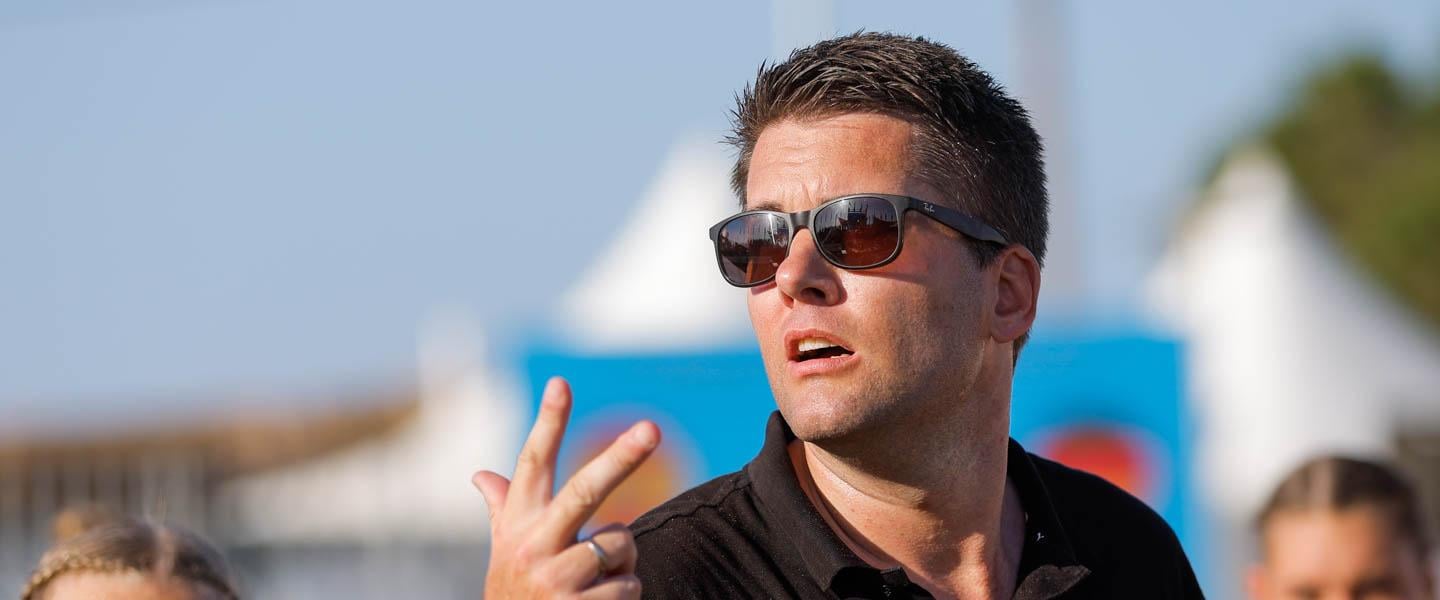News
World championship-winning trainer Novakovic talks about injury prevention
04 Apr. 2023

IHF Women's Beach Handball World Championship-winning coach Alexander Novakovic spoke to a worldwide audience last week about the importance of injury prevention amongst beach handball players.
In the online session, run in partnership with the European Handball Federation Competence Academy & Network (EHF CAN), the Germany women's beach handball coach discussed a number of topics along with Dr Tobias Fikentscher, Senior Physician Foot and Ankle Surgery at the Artemed Klinikum Munich Süd, and EHF Beach Handball Commission chair, Gabriella Horváth.
Dr Fikentscher has been working closely with both Novakovic and the German Handball Association (DHB) on the study of beach handball players and opened the event by going through existing studies and research into the sport.
The evidence he presented clearly highlighted several differences between beach and indoor handball.
These included a lower number of injuries on sand compared to indoors, athletes on sand having a faster recovery than on firm ground and up to 1.5 times more energy expended walking on sand than on a firm surface like grass.
Dr Fikentscher then talked about the challenges for beach handball, such as athletes in sand sports having an increased range of motion of the joints, especially the ankle joint, due to the unstable surface compared to indoor flooring.
External influences in the sport, such as the heat, sun and humidity, combined with the effects of dehydration, were also discussed, as were the benefits of playing on sand, such as fewer impact injuries.
Novakovic then took to the stage and discussed at length the importance of handball players transitioning from indoor handball to beach handball and back again, combined with the management of their load, i.e. how much they are training and playing each week.
He then described how the DHB and his team make individual long-term athletic plans considering both beach and indoor loads.
"The task of all coaches must be to eliminate all injury aspects," explained Novakovic, who also guided his team to the European Championship title in 2021 and a World Games title and stage win of the IHF Beach Handball Global Tour last year.
"It's really important that beach coaches know how to prepare our players to go back to the indoor game and for indoor coaches to know what they can do to make it more effective for their players to go into the beach season.
"We created a six-week transition period between these two seasons with adaption possible concerning load and intensity and time issues," he added. "As a coach you will ask: 'how can I do a six week transition phase - it's not possible', but it is.
"You can use the last third of the indoor season for the first transition phase from indoor to beach handball. There is no need to train extra or to have a special break – simply include the transition exercises in the weekly plans of your players and give the players who are going on the sand a chance for a transition.
"In terms of short-term transition, like an international camp before Christmas, the key is the load and intensity control on the first two days after the surface change.
"You have to be really attentive when you have a short-term transition to sand," he continued. "On the return to indoor training, there should not be body contact – that's really, really important as is having a really close contact between your beach physiotherapist and physiotherapist of indoor handball and close communication between the coaches at the clubs."
Following the conclusion of the presentations, questions were invited from the over 200 people watching live from across Europe and wider afield, including Indonesia, China, Brazil and Pakistan.
Guests included 2018 IHF Women's Beach Handball World Championship-winning coach Maria Karantoni as well as other well-respected coaches and referees.
The session will be made available to view again via eurohandball.com.

